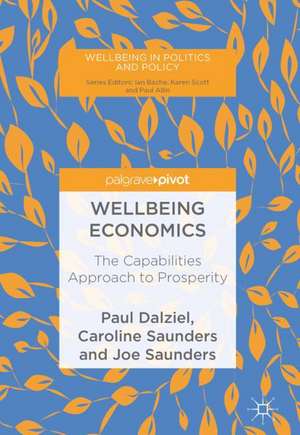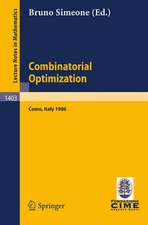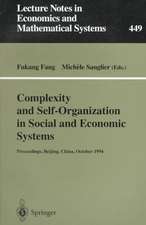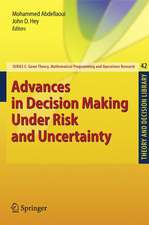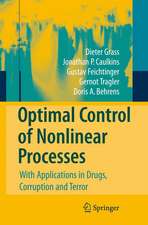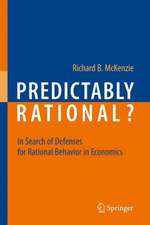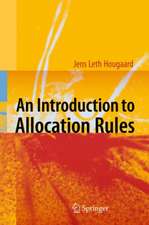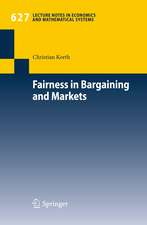Wellbeing Economics: The Capabilities Approach to Prosperity: Wellbeing in Politics and Policy
Autor Paul Dalziel, Caroline Saunders, Joe Saundersen Limba Engleză Hardback – 26 sep 2018
This open access book addresses that challenge. It sets out a wellbeing economics framework that directly addresses fundamental issues affecting wellbeing outcomes. Drawing inspiration from the capabilities approach of Nobel Prize winner Amartya Sen, the book demonstrates how persons can enhance prosperity through their own actions and through collaboration with others.
The book examines national public policy, but its analysis also focuses on choices made by individuals, households, families, civil society, local government and the global community. It therefore offers important insights for anyone concerned with improving personal wellbeing and community prosperity.
| Toate formatele și edițiile | Preț | Express |
|---|---|---|
| Paperback (1) | 217.02 lei 6-8 săpt. | |
| Springer International Publishing – 26 dec 2018 | 217.02 lei 6-8 săpt. | |
| Hardback (1) | 223.19 lei 6-8 săpt. | |
| Springer International Publishing – 26 sep 2018 | 223.19 lei 6-8 săpt. |
Din seria Wellbeing in Politics and Policy
-
 Preț: 54.03 lei
Preț: 54.03 lei - 18%
 Preț: 1111.97 lei
Preț: 1111.97 lei -
 Preț: 422.52 lei
Preț: 422.52 lei -
 Preț: 384.48 lei
Preț: 384.48 lei -
 Preț: 416.54 lei
Preț: 416.54 lei -
 Preț: 418.45 lei
Preț: 418.45 lei
Preț: 223.19 lei
Nou
Puncte Express: 335
Preț estimativ în valută:
42.73€ • 44.58$ • 35.82£
42.73€ • 44.58$ • 35.82£
Carte tipărită la comandă
Livrare economică 12-26 martie
Preluare comenzi: 021 569.72.76
Specificații
ISBN-13: 9783319931937
ISBN-10: 3319931938
Pagini: 232
Ilustrații: XVII, 196 p. 23 illus.
Dimensiuni: 148 x 210 x 20 mm
Greutate: 0.41 kg
Ediția:1st ed. 2018
Editura: Springer International Publishing
Colecția Palgrave Macmillan
Seria Wellbeing in Politics and Policy
Locul publicării:Cham, Switzerland
ISBN-10: 3319931938
Pagini: 232
Ilustrații: XVII, 196 p. 23 illus.
Dimensiuni: 148 x 210 x 20 mm
Greutate: 0.41 kg
Ediția:1st ed. 2018
Editura: Springer International Publishing
Colecția Palgrave Macmillan
Seria Wellbeing in Politics and Policy
Locul publicării:Cham, Switzerland
Cuprins
Chapter 1: From Economic Growth to Wellbeing Economics.- Chapter 2: Persons and Human Capital.- Chapter 3: Households, Families and Cultural Capital.- Chapter 4: Civil Society and Social Capital.- Chapter 5: Market Participation and Economic Capital.- Chapter 6: Local Government and Natural Capital.- Chapter 7: The Nation State and Knowledge Capital.- Chapter 8: The Global Community and Diplomatic Capital.- Chapter 9: The Wellbeing Economics Policy Framework.
Notă biografică
Paul Dalziel is Professor of Economics and Deputy Director of the Agribusiness and Economics Research Unit at Lincoln University, New Zealand.
Caroline Saunders is Professor of Trade and Environmental Economics and Director of the Agribusiness and Economics Research Unit at Lincoln University, New Zealand.
Joe Saunders is Assistant Professor in Post-Kantian Philosophy at the University of Durham, UK.
Caroline Saunders is Professor of Trade and Environmental Economics and Director of the Agribusiness and Economics Research Unit at Lincoln University, New Zealand.
Joe Saunders is Assistant Professor in Post-Kantian Philosophy at the University of Durham, UK.
Textul de pe ultima copertă
Economists have long sought to maximise economic growth, believing this to be their best contribution to improving human welfare. That approach is not sustainable in the face of ongoing issues such as global climate change, environmental damage, rising inequality and enduring poverty. Alternatives must be found.
This open access book addresses that challenge. It sets out a wellbeing economics framework that directly addresses fundamental issues affecting wellbeing outcomes. Drawing inspiration from the capabilities approach of Nobel Prize winner Amartya Sen, the book demonstrates how persons can enhance prosperity through their own actions and through collaboration with others.
The book examines national public policy, but its analysis also focuses on choices made by individuals, households, families, civil society, local government and the global community. It therefore offers important insights for anyone concerned with improving personal wellbeing and community prosperity.
Paul Dalziel is Professor of Economics and Deputy Director of the Agribusiness and Economics Research Unit at Lincoln University, New Zealand.
Caroline Saunders is Professor of Trade and Environmental Economics and Director of the Agribusiness and Economics Research Unit at Lincoln University, New Zealand.Joe Saunders is Assistant Professor in Post-Kantian Philosophy at the University of Durham, UK.
This open access book addresses that challenge. It sets out a wellbeing economics framework that directly addresses fundamental issues affecting wellbeing outcomes. Drawing inspiration from the capabilities approach of Nobel Prize winner Amartya Sen, the book demonstrates how persons can enhance prosperity through their own actions and through collaboration with others.
The book examines national public policy, but its analysis also focuses on choices made by individuals, households, families, civil society, local government and the global community. It therefore offers important insights for anyone concerned with improving personal wellbeing and community prosperity.
Paul Dalziel is Professor of Economics and Deputy Director of the Agribusiness and Economics Research Unit at Lincoln University, New Zealand.
Caroline Saunders is Professor of Trade and Environmental Economics and Director of the Agribusiness and Economics Research Unit at Lincoln University, New Zealand.Joe Saunders is Assistant Professor in Post-Kantian Philosophy at the University of Durham, UK.
Caracteristici
Offers an integrated account of how levels of activity and types of capital investment connect in a Wellbeing Economics framework for policy formulation and implementation Outlines different levels of action for wellbeing, so that central government policies can integrate what is already occurring as a result of individual, household, community, regional and market activities, while recognising that some problems require international collaboration Constructs a positive and rich paradigm for designing policies to raise personal and social wellbeing Is informed by, and provides clear references to, a wide economics literature and practical policy examples Accessible to non-specialist readers
